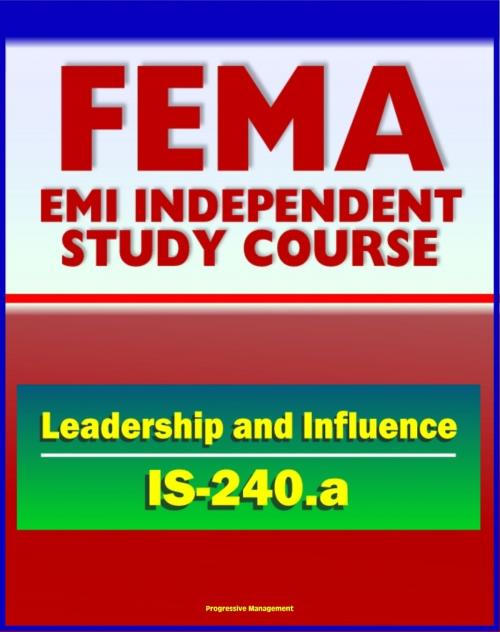21st Century FEMA Study Course: Leadership and Influence (IS-240.a) - Case Studies, Rule of Six, Paradigms, Balancing Inquiry and Advocacy, Personal Influence and Political Savvy
Nonfiction, Social & Cultural Studies, Political Science| Author: | Progressive Management | ISBN: | 9781466069534 |
| Publisher: | Progressive Management | Publication: | July 1, 2011 |
| Imprint: | Smashwords Edition | Language: | English |
| Author: | Progressive Management |
| ISBN: | 9781466069534 |
| Publisher: | Progressive Management |
| Publication: | July 1, 2011 |
| Imprint: | Smashwords Edition |
| Language: | English |
This Federal Emergency Management Agency (FEMA) independent training course manual from the Emergency Management Institute (EMI) is designed to improve your leadership and influence skills. It addresses:
Leadership from within.
How to facilitate change.
How to build and rebuild trust.
Using personal influence and political savvy.
Fostering an environment for leadership development.
Being able to lead others - to motivate them to commit their energies and expertise to achieving the shared mission and goals of the emergency management system - is a necessary and vital part of the job for every emergency manager, planner, and responder.
It probably goes without saying that leadership is critically important when emergencies happen. By its very nature, emergency management connotes leadership - safeguarding life and property by marshalling both the will and the required resources to respond to and recover from an emergency quickly.
To illustrate what can happen when emergency personnel cannot or do not exercise effective leadership, read the following case study and answer the accompanying questions.
National Incident Management System (NIMS) - NIMS is not an operational incident management or resource allocation plan. NIMS represents a core set of doctrines, concepts, principles, terminology, and organizational processes that enables effective, efficient, and collaborative incident management.
Building on the foundation provided by existing emergency management and incident response systems used by jurisdictions, organizations, and functional disciplines at all levels, NIMS integrates best practices into a comprehensive framework for use nationwide by emergency management/response personnel in an all-hazards context. These best practices lay the groundwork for the components of NIMS and provide the mechanisms for the further development and refinement of supporting national standards, guidelines, protocols, systems, and technologies. NIMS fosters the development of specialized technologies that facilitate emergency management and incident response activities, and allows for the adoption of new approaches that will enable continuous refinement of the system over time.
This is a privately authored news service and educational publication of Progressive Management.
This Federal Emergency Management Agency (FEMA) independent training course manual from the Emergency Management Institute (EMI) is designed to improve your leadership and influence skills. It addresses:
Leadership from within.
How to facilitate change.
How to build and rebuild trust.
Using personal influence and political savvy.
Fostering an environment for leadership development.
Being able to lead others - to motivate them to commit their energies and expertise to achieving the shared mission and goals of the emergency management system - is a necessary and vital part of the job for every emergency manager, planner, and responder.
It probably goes without saying that leadership is critically important when emergencies happen. By its very nature, emergency management connotes leadership - safeguarding life and property by marshalling both the will and the required resources to respond to and recover from an emergency quickly.
To illustrate what can happen when emergency personnel cannot or do not exercise effective leadership, read the following case study and answer the accompanying questions.
National Incident Management System (NIMS) - NIMS is not an operational incident management or resource allocation plan. NIMS represents a core set of doctrines, concepts, principles, terminology, and organizational processes that enables effective, efficient, and collaborative incident management.
Building on the foundation provided by existing emergency management and incident response systems used by jurisdictions, organizations, and functional disciplines at all levels, NIMS integrates best practices into a comprehensive framework for use nationwide by emergency management/response personnel in an all-hazards context. These best practices lay the groundwork for the components of NIMS and provide the mechanisms for the further development and refinement of supporting national standards, guidelines, protocols, systems, and technologies. NIMS fosters the development of specialized technologies that facilitate emergency management and incident response activities, and allows for the adoption of new approaches that will enable continuous refinement of the system over time.
This is a privately authored news service and educational publication of Progressive Management.















